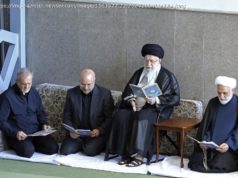Ehud Barak, who once advocated a potential strike on Iran, said that the U. S. withdrawal from the nuclear deal will likely “motivate caution” on Iran’s part.
President Trump’s exit from the Iran deal on Tuesday afternoon could send a signal to the Iranians that Trump is looking for a war. That was the assessment offered by the former Israeli Prime Minister Ehud Barak, in a live interview with The Atlantic ‘s Jeffrey Goldberg, at Washington’s Sixth & I Historic Synagogue Tuesday evening. But if the Iranians believe Trump is looking for an excuse to bomb them, he suggested, they may tread more carefully in the region.
This means the move is a “good” one in the short term, Barak said, insofar as the uncertainty will “motivate caution, not aggression” on Iran’s part. Still, he admitted to mixed feelings about Trump’s announcement: “It is like when your mother-in-law drives your new BMW over the cliff,” he said.
As Prime Minister Benjamin Netanyahu’s defense minister from 2009 to 2013, Barak was intimately involved in deciding how to deal with the Iranian nuclear threat, and he was at one point a proponent of a preventive strike against the regime. In his just-released memoir, My Country, My Life, Barak writes: “Ideally, we hoped the U. S.-led campaign of economic and diplomatic pressure would get Iran to abandon its nuclear ambitions.… There was no doubt in our minds that a nuclear Iran represented a hugely serious threat.”
He recently told The Daily Beast that he thought the Iran nuclear deal—which the Obama administration struck, along with the European Union, the United Kingdom, France, Russia, China, and Germany in 2015 to suspend Iran’s nuclear program in return for lifting sanctions—was “bad,” but saw the “logic in maintaining it in place.”
On Tuesday night, Barak noted that the Iran deal is technically still intact; none of the other parties to the deal, including Iran, has withdrawn. But Trump’s harsh stance signals the beginning of a new phase. (The president said that the U. S. will reinstate “the highest level of economic sanction” on the regime.) Iranians may now be “suspicious” that Trump is gearing up to attack, and Barak believes that his “totally unpredictable” behavior will prevent the Iranian regime from making any aggressive moves of its own: “In a way, this works,” he said. “At least in the short term.”
Barak speculated that the president was likely motivated by two main factors in his decision: He wanted to appear consistent, and was growing “frustrated” on the North Korea front. The decision, Barak argued, will communicate to Trump’s base that the president is willing to follow through on his promises—Trump had vowed repeatedly to get out of the deal unless improvements were made—which is “extremely important.” Secondly, the former prime minister reasoned, Trump may have felt stymied by the lack of options, other than negotiation, to deal with the North Korean nuclear threat. Exiting the Iran deal, on the other hand, looks by comparison like a tangible action.
It also allowed the president to undo one of former President Barack Obama’s crowning foreign-policy achievements. Despite the fact that both presidents are “very pro-Israel,” Obama had a “deep understanding of the nuances of the Middle East,” which Trump does not, Barak said.
There remains the question of what all of this will mean in the future, even if Barak is right that Trump’s move was a good one in the short term. As Barak put it: “Short-term advantages might be balanced by long-term consequences.”






